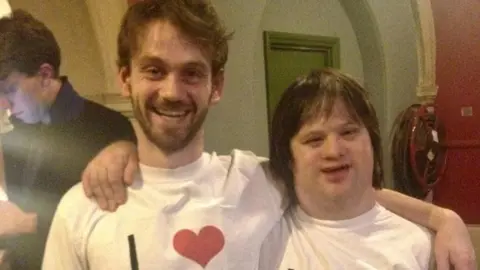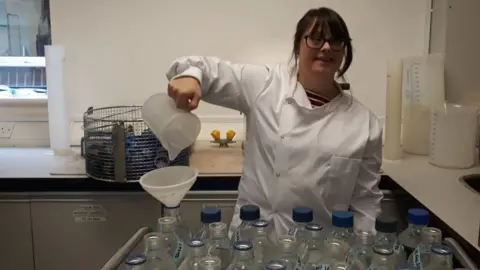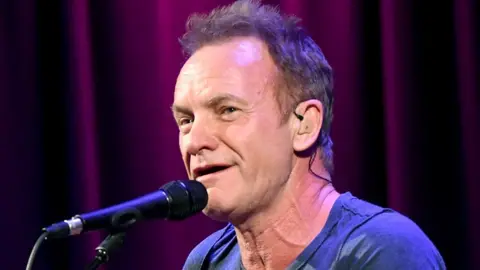Workers with Down’s syndrome: ‘We feel safe’
 BBC
BBC"I clean, wash the plates, pour the coffee and pour the tea - it's an important job," says Tom Cameron, who works in the cafe at Battersea Arts Centre as a kitchen porter.
He hasn't been at his workplace for a long time because of Covid restrictions - and he misses his colleagues.
"I can't wait to get back," he tells Radio 5 Live's Wake Up to Money programme.
Tom is one of 40,000 people in the UK living with Down's syndrome. Unlike many others with the condition, he is in paid work.
Only 5.6% of adults (18-64) with learning disabilities in England were in paid employment in 2019-2020, according to the British Association of Supported Employment.
The organisation called the figure "very disappointing", saying it "reflects the lack of support available to support people with learning disabilities into work".
In the same year, 65% of people with learning disabilities wanted to work.
Meanwhile, the charity Mencap found that 23% of working age adults had a paid job, but that figure dropped to 8% for those working more than 16 hours a week.
For Tom, being in paid employment is important. "It's helped me," he says.
'I feel valued'
Alix Trevisick works for the Pennon Group, the owners of South West Water, preparing and sterilising equipment. She loves her job.

"It's all about working with different people, it gives me an opportunity to prove myself to my family and my work colleagues," she says.
"It's really good being part of a team - I help other people and learn how they work and what their strengths are. I'm always being involved.
"I feel valued in the work I do with them."
The reason so few people with Down's syndrome are in paid work is down to "barriers and prejudices", according to the Down's Syndrome Association, and those with the condition face "a lack of opportunities, low expectations and stereotypical attitudes".
A spokesperson for the charity said: "Every person who has Down's syndrome can work if they want to... becoming more independent, contributing to society, having an income, learning new skills, meeting new people and feeling valued.
"Debunking misconceptions about their potential and the benefits of an inclusive workplace are the stories and experiences of companies, employers and employees."
The hurdles facing people who live with disabilities in gaining paid work is being investigated by a committee of MPs.
The Work and Pensions Committee is looking into the gap between the employment rates of disabled and non-disabled people and what the Department for Work and Pensions can do about it.
Alix's colleague Jo Ecroyd, the head of inclusion at the Pennon Group, says "any responsible business has a duty" to promote inclusion and "reflect the set-up of the communities that we serve and live in".
She says Alix is "brilliant and committed" at her job.
 Getty Images
Getty Images"It's turned out to be a great partnership and something I would really encourage anyone to take part in," she adds.
Meanwhile, Alix's mum, Sarah Trevisick, says the job has enriched her daughter's life.
"I just really am impressed how included she is in the workplace, and I hope it goes from strength to strength," she says.
"I think it's really important - when I had Alix, I was just told she couldn't walk, talk or even live.
"I just don't think there are enough people who realise young people with Down's syndrome can work, albeit maybe on reduced hours, but there is a place out there for everyone."
There are steps being taken to encourage more employers to take on workers with the condition.
Alix's employer is involved in the Down's Syndrome Association's WorkFit initiative, a national employment programme, which has developed 417 employment opportunities since 2011 for people who have Down's syndrome.
And a new international campaign involving Sting is also seeking to make an impact.
CoorDown, an Italy-based charity that works with Down Syndrome International and other charities, worked with the singer on a video called The Hiring Chain, highlighting the benefits of hiring people with the condition.
Allow Google YouTube content?
It reveals the more that people with Down's syndrome are seen in the workplace, the more they will be recognised as valuable employees and the more they will be hired.
The video has been viewed more than five million times - three million of those views via the business networking site, LinkedIn.
The Down's Syndrome Association hopes campaigns such as this can encourage employers to consider making their workforce more inclusive.
The initiative comes amid fears that the proportion of people with the condition who are in paid work "will fall even further" because of the pandemic - as numbers were "painfully low" before Covid-19 emerged.
For Tom and Alix, having paid work is a joy.
"I love working, I love what I do," Alix says.
And although Tom can't yet return to the cafe, he's keeping in touch with his colleagues and friends over video calls for the time being.
His network has really helped him during the pandemic and he recommends paid work to other people with Down's syndrome.
"You need a job. I feel safe with a job, I've got a lot of friends who help me."
